Play
by Mark Rylance and Louis Jenkins
Drawn from the words of Louis Jenkins
Directed by Claire van Kampen
American Repertory Theater
Loeb Theater, Harvard University, Harvard Square, Cambridge
January 17 – February 7, 2016
Scenic Design: Todd Rosenthal; Costume Design: Ilona Somogyi; Lighting Desing: Japhy Wedeman; Composer: Clair Van Kampen); Sound Design: Scott W Edwards
With Kayli Carter (Flo), Bob Davis (The DNR Man), Louis Jenkins (Wayne), Jim Lichtscheidl (Erik), Mark Rylance (Ron)
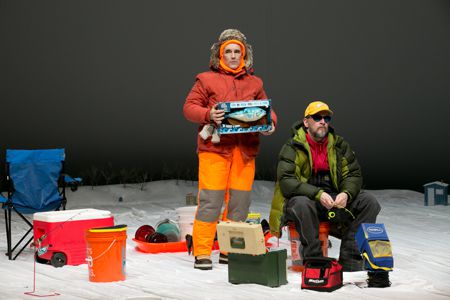
Jim Lichtscheidl as Erik
in “Nice Fish”
PhotoL Evgenia Eiseeva
Courtesy of American Repertory Theater
Mark Rylance is a wonder. His portrayal of Thomas Cromwell in the BBC production of Wolf Hall (2015) was packed with the dense poetry of his craft. A wordless aura hovers around every word, and a deep sense of reflection pervades each moment of his character’s being. This was evident, as well, in his very different role in the recent thriller Bridge of Spies (2015). And, here, now, with a completely distinct and much more comedic character, he pulls off something equally wondrous.
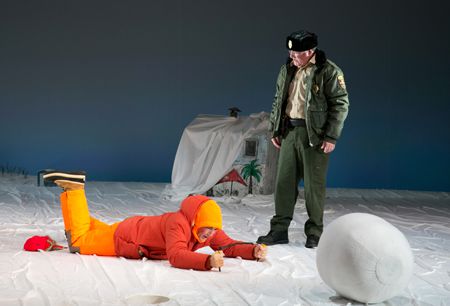
Bob Davis as The DNR Man
in “Nice Fish”
Photo: Evgenia Eiseeva
Courtesy of American Repertory Theater
The amazing thing is that Rylance can, as he does with this role, create someone who seems thin and superficial but then give him a compassionate depth by his careful manner of framing each utterance and gesture. His Ron sounds like an airhead – with a perfect Minnesota accent – but, remarkably one doesn’t think of him as an airhead at all, but as a quite funny, even astute, personality who can say rather simple things with such earnest conviction that he prompts the audience to relentless laughter.
This spirit of resolute down-to-earthness that comes across with enormous irony and humor also pervades the entire production. Erik (Jim Lichtscheidl), Ron’s partner in fishing, also gets to tell endless tales in a tone that hovers between ordinariness and tragedy, and the volley of commentary between the two becomes a kind of priceless offhanded whimsy that echoes deeply through the cavernous space upon which they have landed.
Their physical hijinks are equally entertaining. When Erik tries to set up their auto-expanding ice shelter, Erik is inside and Ron gives it a bang in just the right place to make it collapse – a simple, silly, but very funny moment.
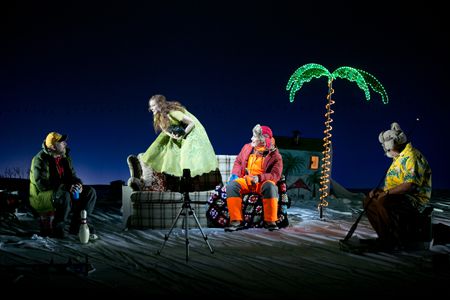
Kayli Carter as Flo
Mark Rylance as Ron
Louis Jenkins as Wayne in “Nice Fish”
Photo: Evgenia Eiseeva
Courtesy of American Repertory Theater
That landscape is comedically peppered in an additionally hefty way by the truly engaging Bob Davis (The DNR Man) who brings the officiousness of a game warden to new, wonderful heights. As he rattles off the run of regulations, his capacity to entertain through potential monotony is incredibly effective.
This signals one of the general marvels of the play generally – its heightening of the monotonous to hilarity through some wonderfully subtle dramatic alchemy.
Kayli Carter (Flo) as a young woman photographer with miscellaneous artistic impulses and a copy of Moby Dick under her arm, brings a slightly different animated sparkle to the scene. She has some great riffs, including a quite long one in which she details a list of people and all their distinctive habits – it’s articulate, lively and animated. The only thing about her character that is a little hard to swallow is the accent which sounds Southern, even though the character theoretically is from The Great Plains. Though it’s a well-rendered accent, it doesn’t sound a lot like where it theoretically is supposed to be from.
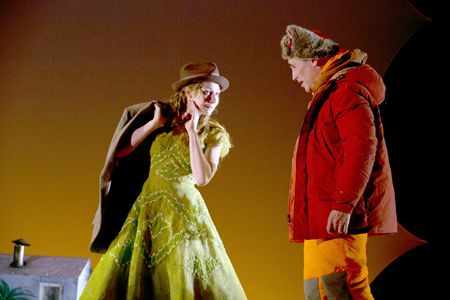
Mark Rylance as Ron
in “Nice Fish”
Photo: Evgenia Eiseeva
Courtesy of American Repertory Theater
As, Wayne, the final addition to the crowd, who shows up but author Louis Jenkins himself, upon whose great prose poetry the play is based, adding a folksy charm that lines up well with the already assembled.
When you are in town, wearing some kind of uniform is helpful, policeman, priest, etc.. Driving a tank is very impressive, or a car with official lettering on the side. If that isn’t to your taste you could join the revolution, wear an armband, carry a homemade flag tied to a broom handle, or a placard bearing an incendiary slogan. At the very least you should wear a suit and carry a briefcase and a cell phone, or wear a team jacket and a baseball cap and carry a cell phone. If you go into the woods, the back country, someplace past all human habitation, it is a good idea to wear orange and carry a gun, or, depending on the season, carry a fishing pole, or a camera with a big lens. Otherwise it might appear that you have no idea what you are doing, that you are merely wandering the earth, no particular reason for being here, no particular place to go.
All sorts of sight gags abound, and they add quite a bit of drama to a play which essentially is largely poetic and not really dramatic at all. The magic of the production is that it has the wandering haze of Waiting For Godot but without even a putative Godot, just an icy expanse. What happens on that expanse and to it, who shows up on it and from where, and how each of the players strut their minutes upon it, provides moments of illumination that make for the equivalent of drama out of the underlying poetry.
Louis Jenkins’ prose poetry, which Mark Rylance came to love, forms the heart and soul of the play. It has a straightforwardness and conciseness that evoke in delicately charmed ironies. Without being forced into lines, each poem states its vision directly, putting forward its encapsulated vision without too much construction or imposition of imagery. It speaks with a clarity that is refreshing. (Some of Jenkins’ poems are posted in the lobby of the Loeb Theater and some are printed in the program. In the lobby one can also buy books of his poems that have been autographed by him and by Rylance.)
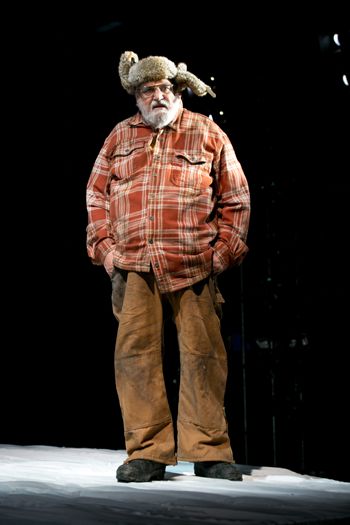
in “Nice Fish”
Photo: Evgenia Eiseeva
Courtesy of American Repertory Theater
How appropriate to set the telling of these poems on a frozen expanse of lake, and through the mouths of mostly unpoetic locals.
But, this is poetry for everybody, and that’s what the heart of this play and this production is about. Using the vernacular, it makes the force of enunciation, the power of spirit behind each word, however mundane sounding, reverberate. Mark Rylance has shown his capacity to do this in a variety of dramatic contexts and it’s a special pleasure to enjoy this invention of his and of Jenkins and of their creative team who have transformed an ice field into a platform for resounding echoes and penetrating wonders.
– BADMan
Leave a Reply